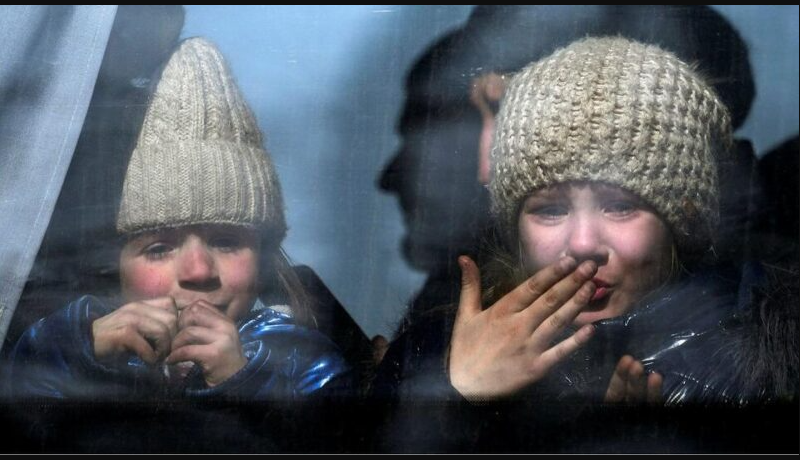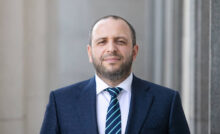Похищение детей — преступление, распространенное среди диктаторов, в том числе у Путина и Лукашенко


Диктатуры и авторитарные режимы, будь то нацистская Германия, ГДР, Аргентина или Россия, всегда прибегали к использованию детей в качестве оружия. Экспозиция в Берлине рассказывает о трагической участи похищенных детей из разных стран, включая Украину.
Леонардо Фоссати Ортега проделал путь из Аргентины в Берлин, чтобы рассказать в Бундестаге – свою историю. Историю похищенного ребенка. Его судьба – одна из многих, которые можно увидеть на выставке, которая сейчас проходит в Берлинской ратуше. Организаторами выступили Федеральный фонд разработки диктатуры СЕПГ (Bundesstiftung zur Aufarbeitung der SED-Diktatur) и Фонд Элизабет Кеземанн (Elisabeth-Käsemann-Stiftung).


Когда в 1977 году родился Леонардо, его родина – Аргентина – находилась под жестоким владычеством военной диктатуры. Его мать Инес была еще подростком и активно участвовала в молодежной организации. Ее парень Рубен – отец Леонардо – учился в университете. Они стали жертвами кровавой хунты и по сей день считаются пропавшими без вести, вероятнее всего, были убиты. Как и многие другие аргентинцы вплоть до конца правления диктатуры в 1983 году.
«Я всегда сомневался в своей идентичности»
Сам Леонардо рос среди чужих людей. “Я всегда сомневался в своей идентичности, потому что мои родители по сравнению с родителями моих друзей были скорее похожи на дедушку и бабушку. Я также не мог найти никакого сходства в их облике”, – поделился он своими воспоминаниями. Лишь 20-летним юношей Леонардо отважился расспросить своих «отцов». «Тогда они рассказали мне правду», — говорит он.
По их словам, одна проживавшая по соседству акушерка рассказала им, что он был заброшенным ребенком молодой женщины из Ла-Платы, которая якобы не захотела покинуть своего ребенка. Леонардо пытался найти акушерку – бесполезно. Решающую подсказку в поисках своей настоящей родни ему дал друг из театрального училища в Буэнос-Айресе, а именно обратиться в организацию «Бабушки Пласа-де-Майо».
Дети, похищенные и рожденные в тюрьме
Эта группа отважных и мужественных женщин была основана во времена военной диктатуры и требовала от власти полной информации о местонахождении их детей и внуков, которые были похищены или родились в тюрьмах. После падения диктатуры «Бабушки Пласа-де-Майо» инициировали создание генетической базы данных с помощью образцов крови.
Это позволило Леонардо разгадать тайну своей подлинной идентичности. «Моя биологическая семья, чья кровь хранилась в базе данных, искала меня почти 28 лет», — объяснил он. Во взрослом возрасте Леонардо встретился со своим дедушкой и бабушкой. От его биологического отца осталось только одно фото, что также показано здесь на выставке в Берлине, от матери – не осталось даже этого.
Многие «похищенные дети» до сих пор разыскивают своих родителей
Леонардо радует, что теперь он знает правду. “Впервые я понимаю сходство с другими людьми – моей семьей”, – говорит он. Около 130 из примерно 500 детей, похищенных во время военной диктатуры в Аргентине, пережили подобный опыт. Судьбы других до сих пор неизвестны, а многие, вероятно, так и останутся неизвестными.
Несмотря на это, Леонардо не собирается впадать в безнадежность и видит себя частью сообщества людей, связанных общей пусть и трагической судьбой. «Для нас очень важно и дальше вести поиски, находить новых друзей и устанавливать новые близкие контакты», — говорит 46-летний мужчина.
Место рождения – спецлагерь
Александеру Латоцкому (Alexander Latotzky) уже 75 лет, он – похищенный ребенок из Германии. Его история на выставке типична для многих подобных трагических судеб, постигших немало людей после окончания Второй мировой войны в советской оккупационной зоне, а впоследствии и в ГДР.
Александер родился в спецлагере Баутцен, где его мать была заключена по обвинению в шпионаже в пользу иностранных спецслужб. Приговор – 15 лет тюрьмы и принудительные работы. Первые два года своей жизни мальчик провел в трех разных лагерях, а затем его отправили в детский дом.
Его отца нацисты депортировали в Германию
Лишь в 1956 году ему разрешили вернуться к матери, которую досрочно уволили из-за тяжелой болезни. Она умерла в возрасте 41 года, что явилось непосредственным следствием заключения. Его мать никогда и не увидела отца своего сына. Он происходил из Украины и был депортирован нацистами в Германию в 1943 году, то есть в разгар Второй мировой войны на принудительные работы.
«Эта выставка невероятно важна для меня, потому что я десятилетиями пытаюсь привлечь внимание к судьбе детей и политзаключенных», — сказал Александер Латоцкий в разговоре с DW. Вскоре после падения Берлинской стены в 1989 году многие, безусловно, интересовались этой табуированной темой, однако потом внимание к этому вопросу угасло. «Почему-то у меня такое ощущение, что люди больше не считают эту проблему столь важной», — отмечает Латоцкий.
Режим ГДР угрожал принудительным усыновлением
Александер Латоцкий по своему горькому опыту знает, что дети всегда – самые слабые члены общества. Во времена социалистической диктатуры в ГДР женщинам часто угрожали насильно лишить их материнских прав и отдать их детей на усыновление в другие семьи, если они не согласятся на сотрудничество. В большинстве случаев это означало сотрудничество с министерством ГДР, или сокращенно «Штази».
«Это один из многих примеров методик, которые диктаторы применяют снова и снова, чтобы оказывать давление на своих оппонентов», — говорит Латоцкий.
Александер Латоцкий родился в 1948 году в советском спецлагере Баутцен и был вынужден провести много лет в детских домах. Фото: Bundesstiftung Aufarbeitung
Эвелин Цупке знает много таких историй. Она уполномочена немецкого Бундестага по делам жертв диктатуры СЕПГ. Аббревиатура СЕПГ расшифровывается как Социалистическая единая партия Германии, господство которой в Восточной Германии удалось свергнуть только во время мирной революции 1989 года.
Жертвы, нарушающие молчание
“Меня всегда трогает разговор с жертвами о том, что с ними произошло, – говорит Эвелин Цупке. – Прекратить молчание – это большой вызов жертвам. И большая польза для нашего общества”.
Такие люди, как Александер Латоцкий из Германии и Леонардо Фоссати Ортега из Аргентины, воочию наглядно зачастую абстрактны жизнеописания. Многие биографии, представленные на берлинской выставке «Похищенные дети», также происходят из других стран, в частности из бывшего Советского Союза, Сальвадора и Канады.
Дети, похищенные Россией из Украины
«Насильственный развод родителей и детей не остался в прошлом», — говорится на текстовой панели выставки. “С момента российского вторжения в Украину тысячи детей были похищены из восточной Украины в Россию. Китайские власти депортируют уйгурских детей в лагеря перевоспитания, а террористические организации, такие как “Боко Харам”, намеренно похищают девочек в Нигерии”, – отмечают авторы сообщения.
Модульный принцип выставки, которая сейчас проходит в Берлинской ратуше, призвана облегчить ее путешествие из столицы Германии в другие страны мира.
Recent Posts
Сбежавший в Швейцарию блогер Станислав Домбровский просит прощения у украинцев
Одесский трэш блогер Стас Домбровский, который в последнее время проживает в Швейцарии, записал видеообращение к…
Александра Устинова и атака на руководство АОЗ: что стоит за волной критики
Александра Устинова, народная депутат, которая в последние дни активно атакует Агентство оборонных закупок (АОЗ) возможно…
Журналисты показали имение киевской судьи, закрывшей дело Приходько
Свобода "под ключ" или манипуляция правосудием? Борис Приходько – нацбанкир времен Януковича и действующий нардеп…
Судьи вне закона
В течение последних трех лет внимание общественности если и бывает приковано к судам, то гораздо…
Артем Ляшанов и bill_line спасают репутацию через суд
Финтех-компания столкнулась с обвинениями в отмывании денег игорной мафии. ООО «Тех-Софт Атлас» (ТМ «bill_line») и…
Криптобиржа WhiteBIT: как Владимир Носов и «регионалы» Шенцевы отмывают деньги и помогают спецслужбам России
Владимир Носов в Украине пытается позиционировать себя как респектабельный бизнесмен и хозяин криптобиржи WhiteBIT. Однако…


